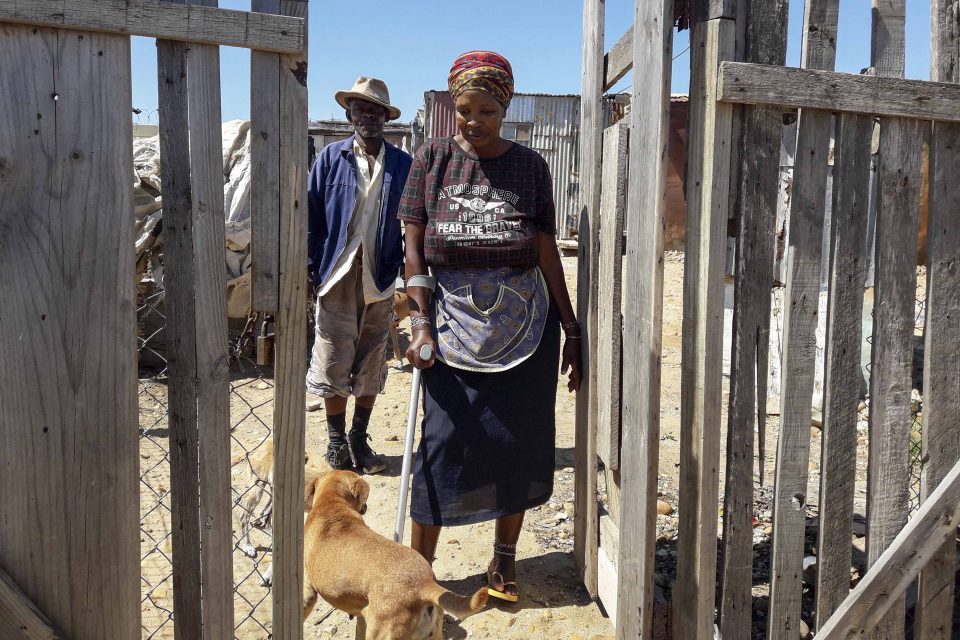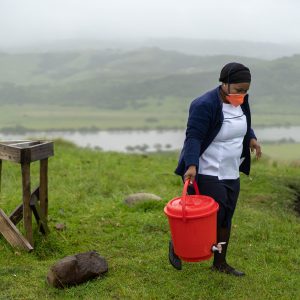Raining on shack dwellers’ dream of a better life
The Nelson Mandela Bay Municipality in the Eastern Cape does little to improve the living conditions of those who live in shack settlements in and around Gqeberha, residents say.
Author:
28 April 2021

Silvertown, a shack settlement in KwaZakhele, Gqeberha, has been in existence for well over 30 years. Many residents moved there in the 1980s in an attempt to start families and build livelihoods in the city.
Named after the silver corrugated iron structures that dotted the area in its early days, Silvertown is said to be one of the oldest shack settlements in Gqeberha.
The 2011 Statistics South Africa census found that it had at least 508 households. Owing to an increasing housing crisis in the city, the number of shack dwellers in the settlement has since increased.
“When I came here I was young. I later had my own children [and] thereafter left my parents’ shack to build my own. We are constantly building shacks here because we have children and these structures are too small for a family of six or eight people to live [in]. Poverty and unemployment are very high here,” said Mimi Dontse, 45.
Older residents who have been living in the area since childhood say their lives are even more difficult now as the delivery of services by the local government has not got any better. It is hard for them, in their frail state, to access proper healthcare and live in relative comfort.
Related article:
“I arrived here in 1987. Till today I am still here. We are living in a damp area. When it rains we brace ourselves for the worst flood. Each and every year, local government takes out a budget, but I don’t know what happens to our budget. We already have had three councillors in this place. Each tries and fails to fix this place. Some of them tried to get roads for certain areas, but failed to get us the top structure we need, which are houses,” said Sthembele Nxabane, 66.

Another elderly resident, who has lived in the settlement for more than 35 years, says she is tired of fighting for a decent home. Sisana Ngesi, 85, arrived in Silvertown in 1986 and has been battling with rotting housing structures, large rats and a lack of sanitation.
“When it rains here, our homes are damaged. We need to consistently replace the material. In 2018, the municipality came to install outside toilets and that gave us an ounce of hope, but then nothing else happened after that,” said Ngesi.
There is no medical clinic in Silvertown, which is a big problem for the residents. What makes it worse is that emergency services often take hours to arrive after being contacted and sometimes do not arrive at all. Emergency personnel do not prioritise shack settlements, residents say.
Related article:
“When I was sick during the pandemic, my family called the ambulance and they were told by the emergency centre that the ambulances were not available and the hospitals were full. I didn’t have Covid-19, this I told them. But I was told to rather seek medical attention in another town. My daughter had to take me to Port Alfred Hospital in Ndlambe municipality. That is how I got help. I thought I was going to die. I even told my neighbour to keep my groceries safe because they might need it for my funeral. It was a painful experience,” said Ngesi.
All that is available in the area is a government mobile clinic that arrives only twice a week. Because of overcrowding, many residents opt to travel to clinics in Motherwell instead.
Waiting for relocation
Shack fires in Endulwini and Edongweni in 2019 and 2020, respectively, displaced hundreds of people. While many decided to stay and rebuild their homes, 26 people chose to seek refuge at the KwaZakhele township hall, which falls under the Nelson Mandela Bay Municipality. The municipality only moved them to newly built shacks near Inkqubela Primary School in April 2020, and only because of the rising threat of Covid-19.
Here, residents were only provided with four mobile toilets and a single tap. Many lost all their belongings in the fire, including identity documents and children’s birth certificates. Because of long queues at home affairs offices, they have not been able to get replacements. They say that their only wish is to be provided with “decent living conditions”.
Related article:
Nonceba Sikhulu, 58, lost her home in one of the fires. “I lived in those shacks since 1980 and the government had been promising us houses, yet nothing was done since. Life is hard. We have no privacy because there are only four mobile toilets for 26 people, and sometimes the toilets fill up and are not [cleaned] for more than two weeks because we have nowhere else to go.
“At night, it is most frightening because as women you fear being attacked as you leave your house to [use] the toilet outside. We don’t even have electricity here. So, it is pitch dark at night. Some of us are forced to use illegal connections just to get some electricity,” Sikhulu said.
Where the fire occurred in Endulwini, well over 100 shacks were affected.

“Our shacks burnt down in December 2019. We stayed at the hall for over three months. The municipality didn’t know what to do with us. Then in April 2020 they moved us here in these temporary structures. The last time we saw the councillor here was when we came here in April… He promised us electricity, yet it’s been almost a year now since we were placed here… We have no electricity. We were promised houses in Motherwell yet we are still here,” said Zolisa Williams, 38.
KwaZakhele councillor Gamelihle Maqula said: “The land they are placed on is private land. It is not owned by the municipality. Our plan to move the residents was halted because the houses they were allocated in NU 30 in Motherwell had been illegally occupied, so the municipality took the matter to court and a court order was issued to evict the illegal occupants… We are waiting for the municipality to open up relocations again and then we can move them.”
Residents say that their neglect by the municipality has resulted in some of them having a “carefree” attitude towards the local government elections taking place in October and they might not vote.
Scourge of fires
Fires burning down shack settlements affect hundreds, if not thousands, of lives each year. Many factors contribute to the problem, including highly flammable building materials, the use of candles and illegal electricity connections. It is easy for fires to spread as well because the shacks are built closely together.
Dontse remembers the fire that destroyed their homes in Silvertown. “It was around 7am in the morning when we noticed the fire. I quickly took all my children out of the house while my neighbours desperately tried to put the fire out with buckets of water. I then ran to my parents’ house, which is close by, to alert them that my house was on fire.

“When I got back I was told my eldest son had run back into the burning house. I was confused as to what made him run back when I had saved them all,” said Dontse.
The neighbours tried to put out the fire, without success. The fire brigade only arrived hours after they had been alerted.
It is not just property that residents lose in these fires. Lives are lost too.
“My son died that day. His burns were too severe, he was in that fire for too long. So now I live with my only son at my parents’ shack. I am still trying to rebuild my life,” said Dontse.
-

18 February 2021- Zolisa Williams(38) , has been living in her deteriating kwa zakhele temporary structure for a year now. She lives in hope that the Nelson Mandela Bay Municipality will one day allocate them houses as promised. -

19 March 2021- Ncedakele Ngwani(46), struggles with mobility in the poor infrastructured Silvertown shack settlement.



